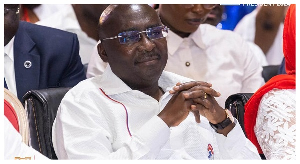 Vice President, Dr. Mahamudu Bawumia
Vice President, Dr. Mahamudu Bawumia
Flagbearer of the New Patriotic Party (NPP), Dr. Mahamudu Bawumia, argues that the Akufo-Addo administration has managed the country's exchange rate regime better than the National Democratic Congress (NDC).
He contends that despite ongoing global economic challenges, the NPP's handling of the exchange rate shows superior economic management compared to the NDC's track record.
During the previous NDC administration, the cedi depreciated and was trading at around GH¢4 to the US dollar ending 2016, while the current ruling NPP has seen rates above GH¢16 to the US dollar as of November 2024.
To support his argument, he criticised the NDC for lacking a proper understanding of how exchange rates are measured and managed.
“I want to talk about the exchange rate and I want them (NDC) to listen because they don’t understand. When it comes to the exchange rate, we measure the performance of by the rates of depreciation and when you look at their period the Cedi depreciated by 74% without a global crisis, no Russia-Ukraine war, no COVID-19 outbreak and no global economic recession and under the NPP for eight years with a global economic crisis, we have depreciated the Cedi by 72% which is lower than their depreciation,” he stated.
As the upcoming general elections approach, the Vice President has called on Ghanaians to consider external factors and the broader context when evaluating the government's economic performance.
Meanwhile, a recent study reveals that the cedi's depreciation has been primarily driven by weak economic fundamentals rather than external shocks like the COVID-19 pandemic or the Russia-Ukraine war.
The research, led by Professor Alex Annan Abakah of Bentley University, challenges government claims that global events are responsible for Ghana's economic challenges.
During a recent policy dialogue organised by the PFM Tax Africa Network titled 'Is the COVID-19 and Russia-Ukraine War to be Blamed for Ghana's Current Economic Challenges?', Professor Abakah presented findings indicating that the cedi's depreciation largely reflects structural weaknesses in the economy.
In the first nine months of 2024, the Ghanaian cedi depreciated by 28 percent year-on-year against the U.S. dollar, compared to a 9.78 percent decline during the same period in 2023.
This continued depreciation is attributed to strong corporate demand for dollars and shifts in investor sentiment following the U.S. Federal Reserve's monetary policy decisions.
SSD/MA
Watch the latest edition of BizTech below:
Click here to follow the GhanaWeb Business WhatsApp channel